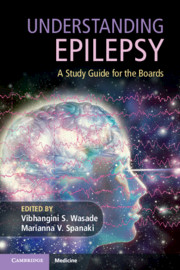Book contents
- Understanding Epilepsy
- Understanding Epilepsy
- Copyright page
- Dedication
- Contents
- Contributors
- Preface
- Chapter 1 Pathophysiology of Epilepsy
- Chapter 2 Physiologic Basis of Epileptic EEG Patterns
- Chapter 3 Pathology of the Epilepsies
- Chapter 4 Classifications of Seizures and Epilepsies
- Chapter 5 Electro-clinical Syndromes and Epilepsies in the Neonatal Period, Infancy, and Childhood
- Chapter 6 Familial Electro-clinical Syndromes and Epilepsies in Adolescence to Adulthood
- Chapter 7 Distinctive Constellations and Other Epilepsies
- Chapter 8 Seizures Not Diagnosed as Epilepsy
- Chapter 9 Nonepileptic Spells
- Chapter 10 Status Epilepticus
- Chapter 11 EEG Instrumentation and Basics
- Chapter 12 Interpreting the Normal Electroencephalogram of an Adult
- Chapter 13 Ictal and Interictal Epileptiform Electroencephalogram Patterns
- Chapter 14 Neonatal and Pediatric Electroencephalogram
- Chapter 15 Scalp Video-EEG Monitoring
- Chapter 16 Intracranial EEG Monitoring
- Chapter 17 Neuroimaging in Epilepsy
- Chapter 18 The Role of Neuropsychology in Epilepsy Surgery
- Chapter 19 Principles of Antiseizure Drug Management
- Chapter 20 Gender Issues in Epilepsy
- Chapter 21 Antiseizure Drugs
- Chapter 22 Surgical Therapies for Epilepsy
- Chapter 23 Stimulation Therapies for Epilepsy
- Chapter 24 Practical and Psychosocial Considerations in Epilepsy Management
- Chapter 25 Comorbidities with Epilepsy
- Chapter 26 System-Based Issues in Epilepsy
- Index
- References
Chapter 8 - Seizures Not Diagnosed as Epilepsy
Published online by Cambridge University Press: 11 October 2019
- Understanding Epilepsy
- Understanding Epilepsy
- Copyright page
- Dedication
- Contents
- Contributors
- Preface
- Chapter 1 Pathophysiology of Epilepsy
- Chapter 2 Physiologic Basis of Epileptic EEG Patterns
- Chapter 3 Pathology of the Epilepsies
- Chapter 4 Classifications of Seizures and Epilepsies
- Chapter 5 Electro-clinical Syndromes and Epilepsies in the Neonatal Period, Infancy, and Childhood
- Chapter 6 Familial Electro-clinical Syndromes and Epilepsies in Adolescence to Adulthood
- Chapter 7 Distinctive Constellations and Other Epilepsies
- Chapter 8 Seizures Not Diagnosed as Epilepsy
- Chapter 9 Nonepileptic Spells
- Chapter 10 Status Epilepticus
- Chapter 11 EEG Instrumentation and Basics
- Chapter 12 Interpreting the Normal Electroencephalogram of an Adult
- Chapter 13 Ictal and Interictal Epileptiform Electroencephalogram Patterns
- Chapter 14 Neonatal and Pediatric Electroencephalogram
- Chapter 15 Scalp Video-EEG Monitoring
- Chapter 16 Intracranial EEG Monitoring
- Chapter 17 Neuroimaging in Epilepsy
- Chapter 18 The Role of Neuropsychology in Epilepsy Surgery
- Chapter 19 Principles of Antiseizure Drug Management
- Chapter 20 Gender Issues in Epilepsy
- Chapter 21 Antiseizure Drugs
- Chapter 22 Surgical Therapies for Epilepsy
- Chapter 23 Stimulation Therapies for Epilepsy
- Chapter 24 Practical and Psychosocial Considerations in Epilepsy Management
- Chapter 25 Comorbidities with Epilepsy
- Chapter 26 System-Based Issues in Epilepsy
- Index
- References
Summary
Despite recent changes in the key criteria required for the diagnosis of epilepsy,1 there remains a population of patients who suffer from seizures that can recur, but do not fit the clinical definition of epilepsy. In 1993, the International League Against Epilepsy (ILAE) developed standard definitions for use in the epidemiological study of epilepsy, including definitions of epilepsy and epileptic seizures.2 At that time, the ILAE created two categories of patients with epileptic seizures who did not necessarily meet the criteria of epilepsy: febrile seizures and benign neonatal seizures. Febrile seizures are acute symptomatic and electrographic seizures that occur in the context of a febrile illness. Benign neonatal seizures are acute symptomatic seizures occurring in the neonatal or infantile period, with a demonstrable electrographic correlate, but are thought to result in a benign outcome and normal development. Since that time, the definition of epilepsy has been revised, and both of these categories of patients have been the subject of further study.3 This chapter will review the most up-to-date information about febrile seizures and benign neonatal seizures.
Information
- Type
- Chapter
- Information
- Understanding EpilepsyA Study Guide for the Boards, pp. 165 - 175Publisher: Cambridge University PressPrint publication year: 2019
